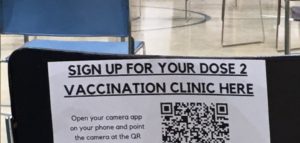My husband and I got our first dose vaccine shot on Saturday. And yes, there is a sense of relief to be at this point a year after it all started. 
March 5, 2020 feels like the last normal day for me. I had lunch in a restaurant with my daughter who is an NP at a Boston hospital. I was anxiously waiting to hear that HIMSS20 would be cancelled and wondered what they were waiting for. I discussed the risks of going with my daughter. I decided during that conversation not to go even if they held it (I got the cancellation notice as we were leaving the restaurant). I asked her about the Coronavirus from a clinical perspective. She said we’re “f’d” and projected 100,000 cases in the U.S. by April 1st. We now know it was to be far worse.
As a frontline healthcare worker, she was fully vaccinated by early January. Two weeks ago, she helped about fifteen of her husband’s 65 years and older family members and their friends navigate the somewhat confusing multiple websites in Massachusetts to schedule first dose appointments.
Here is my Rhode Island story. The vaccination site was a junior high in our town. Overall, it was a smooth process. When we pulled into the parking lot there was a sign that said wait in your car until 5 minutes before your appointment to avoid people crowding at the door. Our town Mayor was there working – that was a pleasant surprise. He took temperatures and asked initial screening questions at the door. I greeted him and commented on the fact that he was working – his somewhat joking reply was, “I have to earn my keep”.
Next, we went to the “check in” table. We gave them our IDs and they looked us up on the list of people scheduled for an appointment that day. The list was in no sort order, so it took a while. We then moved into the gymnasium where there were about eight vaccine stations. Firefighters and EMTs gave the actual shots. My husband was considered to have moderate risk of a reaction, so his PCP advised him to stay for 30-minute observation. When he shared that information, a physician was called over to ask him a few questions before he got the shot.
With information on how to sign up for the CDC’s v-safe app (after vaccination health checker), and our vaccination cards in hand we went to the observation area with many seats set up socially distanced. There were several people wandering around the area offering to help you make your second appointment or you could just use the QR code they provided on posters visible on the backs of the chair in front of you to sign up for 4 weeks out.
If you know me well, you know that I always have an eye out for process improvements. Continue reading







